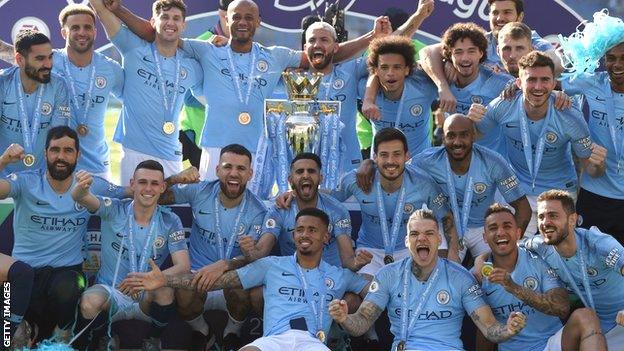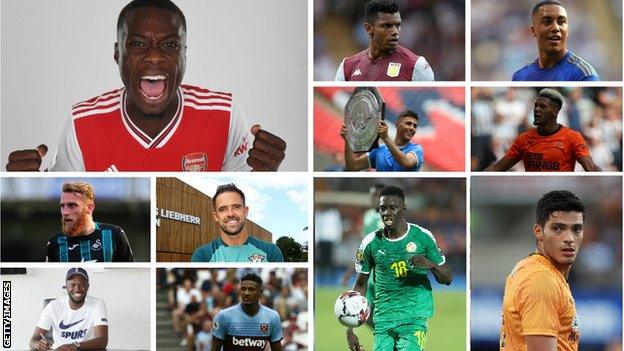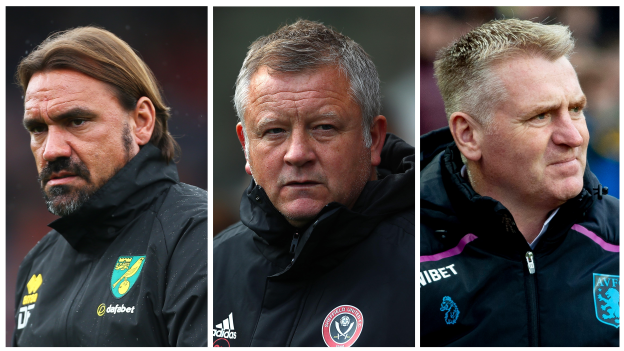Premier League 2019-20: New signings, new rules, VAR
- Published

Manchester City earned a combined 198 points in the last two seasons
The Premier League kicks off this weekend as Manchester City bid to win the title for a third consecutive year.
Liverpool, last season's runners-up, open the campaign on Friday against Norwich (20:00 BST), with City at West Ham on Saturday (12:30 BST).
Several new laws, plus video assistant referees, have been introduced to England's top flight this season.
Eleven of the 20 clubs broke their transfer record, while there have been three new managerial appointments.
Domestic treble winners City, who have picked up 198 points in the past two seasons, are bidding to become the first team to win three Premier League titles in a row since Manchester United's hat-trick of titles from 2007 to 2009.
European champions Liverpool, who earned 97 points last season - a record high for runners-up in any of Europe's top five leagues - are tipped to be their main rivals again.
Tottenham, Chelsea, Manchester United and Arsenal are the other teams expected to be battling for Champions League places.
Premier League: Reasons to be excited for the new season
The new faces

Nicolas Pepe (Arsenal), Wesley Moraes (Aston Villa), Youri Tielemans (Leicester), Rodri (Man City), Joelinton (Newcastle), Oli McBurnie (Sheffield United), Danny Ings (Southampton), Tanguy Ndombele (Tottenham), Sebastien Haller (West Ham), Ismaila Sarr (Watford) and Raul Jimenez (Wolves) have all gone for club-record fees this summer
There has been the usual high turnover of players, teams and managers this summer.
England defender Harry Maguire's £80m switch from Leicester to Manchester United was the biggest Premier League signing of the summer, while they sold striker Romelu Lukaku to Inter Milan for £74m.
Arsenal spent £72m to sign Lille winger Nicolas Pepe, while Manchester City bought Atletico Madrid midfielder Rodri for £62.8m and Juventus right-back Joao Cancelo for £60m. Spurs spent £53.8m on Lyon midfielder Tanguy Ndombele. That was their first first-team signing since January 2018.
The other biggest transfers are Manchester United right-back Aaron Wan-Bissaka (£50m from Crystal Palace), West Ham striker Sebastien Haller (£45m from Eintracht Frankfurt), Newcastle striker Joelinton (£40m from Hoffenheim) and Leicester midfielder Youri Tielemans (reported £40m).
Chelsea also spent £40m on Real Madrid midfielder Mateo Kovacic despite having a transfer embargo. He was already registered with the club from last season's loan deal.
Promoted Sheffield United broke their transfer record four times, while Aston Villa spent over £100m. The third promoted team, Norwich, have brought 11 players in, but mostly for smaller fees, loans or free transfers.

Norwich's Daniel Farke (left), Sheffield United's Chris Wilder (centre) and Aston Villa's Dean Smith (right) are all Premier League managers for the first time
Chelsea, Newcastle and Brighton all have new managers. Maurizio Sarri left Chelsea for Juventus and was replaced by their all-time top scorer Frank Lampard, who was Derby manager last season.
Rafael Benitez left the Magpies at the end of his contract and was replaced by Sheffield Wednesday boss Steve Bruce, while the Seagulls sacked Chris Hughton and hired Swansea's Graham Potter.
Potter, Lampard, Aston Villa boss Dean Smith, Sheffield United's Chris Wilder and Daniel Farke of Norwich are all managing in the Premier League for the first time.
VAR and new laws...
Manchester City beat Liverpool on penalties to take the 2019 Community Shield
The video assistant referee system which has become commonplace elsewhere in football is being used in the Premier League this season for the first time.
The Premier League's guiding principle is that it be used for "clear and obvious errors" and "serious missed incidents" in four types of match-changing incidents: goals, penalties, straight red cards and mistaken identity.
It aims to use VAR less frequently that some other competitions to achieve "minimum interference" to the game.

A dozen new football laws came in this summer so will make their debut in the Premier League from Friday.
Among them are a change to the wording of the handball law. Accidental handball is now an offence if it leads to a goal, if a player's arm or hand is above their shoulder, or if it makes their body "unnaturally bigger".
Drop balls will now be uncontested, goal-kicks can be taken to a team-mate in the box, attacking teams cannot put their players in a defensive free-kick wall and coaches can be booked - as Manchester City boss Pep Guardiola was in the Community Shield.

There will be a winter break for the first time, although there will still be Premier League games on both weekends of it. Five games will be played on the weekend of 8 February, with the other five on the following week. All the games will be shown on TV.
That means all 20 clubs will get two weeks off between Premier League games, although teams will not discover which weekend they will play on until December.
A very minor change - and one that has never been needed - sees the Premier League factor in head-to-head results to separate teams level on points, goal difference and goals scored.
How you can follow the Premier League on BBC Sport
The BBC Sport website and app will have live text commentary of every single Premier League game this season.
Match of the Day returns on Saturday at 22:30 BST on BBC One and online. As well as Match of the Day 2, Football Focus and Final Score, MOTD will take place in a new 360-degree virtual studio using computer game rendering technology.
All programmes will be based within a 'BBC Sport football stadium'.
Starting in September, MOTDx is a brand new magazine programme focusing on the lifestyle and culture of the Premier League. Chelcee Grimes, Craig Mitch, Reece Parkinson and Liv Cooke will join regular host Jermaine Jenas and will dive into the world of music, fashion, culture and football events.
BBC Radio 5 Live will have commentary of 140 Premier League matches, starting with Liverpool v Norwich on Friday, more than any other UK broadcaster.